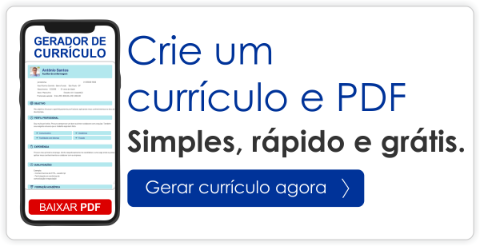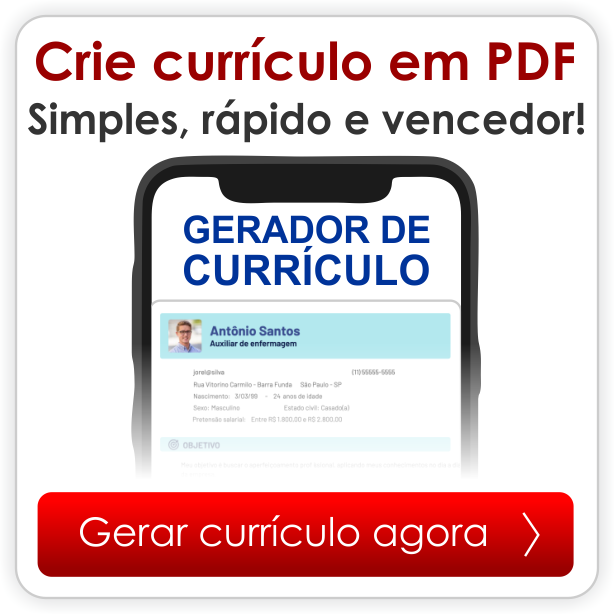Job Interview – How to Be Prepared?
You receive a call. The HR manager informs you the date of that job interview you were hoping for. Her heart races, a chill goes up her spine and her legs tremble.
Scheduled interview!
At that point, your thinking turns to any questions that may arise during the job interview. Nervousness takes over the majority of candidates. Do not worry.
Of course, the expectation and anxiety are great. Those who go through a selection process and get to the day of the job interview know how exhausting it is.
And, after all, you want this job, right?

Your preparation should start now
Knowing each step of the interview process, knowing how you should behave and of course preparing for the big day are your goals from now on.
It is important to know that the interviewer already has in mind a profile and requirements for the position you will be interviewed. After all, opening up a job vacancy also generates high expectations in who is hiring.
The cost of staff turnover is enormous for any company, so striking the candidate’s profile during the interview is the biggest concern of the interviewers.ante a entrevista, já que estará melhor preparado do que a maioria.
So the more objective information about you and your career you gather, the better your performance will be. Of course, you will also behave more appropriately during the interview, as you will be better prepared than most.
In addition, the interviewer can evaluate you with more valuable information and it will be easier to decide if (or who) you are the best candidate for the position.
Types of Job Interviews

There are some types of dynamics during a job interview. Depending on the position of the position you are running they may be applied in different ways.
The advantage of knowing the types of interviews is that you can prepare for them more easily.
- Behavioral Interview: Focus will be on your skills and your skills. This is certainly the most common interview model.
- Technical interview: your technical knowledge will be the most important point
- Group interview: usually used for internships or traineeships. Several candidates participate at the same time of the interview, being evaluated through dynamics and games. Here the interaction with the other participants counts a lot!
- Case study interview: Your ability to analyze data and solve problems based on a real or fictitious case is what will be the strength of the interview
- Panel interview: a type of evaluating bank, with different positions and functions, unite to ask questions and analyze their behavior from different perspectives
Tips on how to prepare for the big day
The easy part of your journey has arrived until the arrival of the day of your job interview.
Now is the time for hindsight, lots of notes, a timeline, and strategies for getting that job.
-
Take your resume and do a retrospective
Write down all the facts that have stood out and the biggest difficulties you faced during your career.
It may seem silly, but annotation will remind you of important things that can run out of the mind or give the famous “white” at the time of the interview.
Try to remember the achievements, but also how you deal with frustration and pressure. Certainly some of these questions you will face on the day of your meeting with the interviewer.
Se inglês for um dos requisitos da vaga, é uma boa ideia escrever situações vividas em inglês.
Tip: Hint: no resume yet? Make yours here!
When you remember something interesting and relevant, use the STAR technique to describe the fact. It will help you give a complete perspective on something important.
- Situation: describe the situation
- Task: Write down your tasks and responsibilities
- Action: Tell what actions and decisions you have taken to complete your tasks
- Result: Mention what results you have achieved with your actions
This technique will make it easier for you and the interviewer..
-
Make a timeline
Put your top achievements and your role or company changes in a timeline.
-
Research everything you can about the company where you will be interviewing
Above all, knowing interesting facts about the company that may be your future employer can yield a good interaction with the interviewer.
You should also take advantage to know what the company values. Compare with your values and see what you have in common.
-
Start thinking about your outfit for the interview
After knowing a little more about the company you should already know about the dress code appropriate for the day of the interview.
If you do not know, prefer to follow the pattern.
However, avoid drawing too much attention. Think of someone who can look quickly at you and should have a good impression..
-
Learn the routes to get to the interview site
You will save a lot of stress if you know the way and know how long it takes to get to the job interview.
Questions that may occur during your job interview
There are some questions that are common in job interviews. To help, we’ve put some tips on answers that will make you do well on your journey.
-
Tell me about yourself
This question is a cliché among many interviewers. In this first contact it is of the utmost importance that you prove yourself safe. Be brief in your response and highlight your best professional moments, your development, your skills and strengths.
-
Point out three strengths
They certainly look for people who are persistent, dedicated, skilled, focused, and many other qualities.
Be honest, but look for strengths that are important for the job too.
-
Point out 3 weaknesses
This is a sensitive issue and has to be answered very carefully.
The interviewer knows that you have weaknesses, after all we all do, but he wants to know your perception of them.
The most important thing is to show how you develop in relation to your weaknesses and how you seek continuous improvement.
Avoid weaknesses that are directly related to the job, but do not lie.
-
I would like to know your goals
Talk about how you want to evolve and learn more. Express interest in the company and how it can add value to it.
Showing that you are willing to take responsibility and take root can be a positive point.
-
Why should we hire you?
Mention how your values are aligned with those of the company and show how you are qualified for that position.
-
Why did you quit your last job?
The biggest asset to this question is honesty. Do not talk bad about the last company or your co-workers.
Say that in the past the company motivated you a lot and is very grateful for the learning you got there, but you are looking for new challenges and experiences and that you see in this job opportunity the way to growth.
-
How you handle pressure at work?
The interviewer wants to find out how you react during a difficult situation and what your posture is in the face of a problem.
Describing a radical stance is not a good idea.
-
Briefly tell us about your past job that caused you stress
Focus on solving the problem. Share how you made the decisions and expose your logical thinking and tranquility in the face of a problem, not forgetting to tell the positive outcome you have gained or what you learned from the situation.
-
What salary do you want to earn?
Mention a salary range and not an exact amount. You can also ask about the benefits offered. Make it clear that you are open to negotiations.
-
How do you see your career in 10 years?
This is the time to show that you have a plan for your career. Express your interest in the company and tell us how you want to progress within it. The main objective of the interviewer is to check their consistency and planning for their growth.
-
What is your level in foreign languages?
Here you will be assessed your knowledge and your speaking foreign languages. It is possible that the conversation continues in the foreign language.
Train the language before going to the interview and put your correct fluency level in the resume.
-
Why did you choose our company to work for?
The purpose of this question is to know how much you know about the company and to know if your goals are compatible with the intended position.
Specify your knowledge and skills for the position and say that you are easily interacting with the organization, because it identifies with the values of the company.
Of course, do this only if you really identify yourself.
-
What do you expect from this job?
You can say that you are looking for new opportunities and purposes, where you can develop professionally and collaborate with the growth of the company.
-
What would a dream job look like?
Your creativity is being tested.
You can respond in a practical way by emphasizing your strengths and linking your qualifications to the vacancy or being creative and finding ways to describe job responsibilities, but working online from anywhere in the world, for example.
Just be careful. If the vacancy does not allow this,
use creativity to create a new scenario.
-
How long do you plan to stay in this company?
You can say that your plan is to contribute as much as possible to the organization and you want to stay as long as you have the opportunity.
-
How do you behave when you receive criticism?
Let the recruiter know which criticism is welcome and cite some examples where he lived situations that received criticism and corrected his failures obtaining positive results.
-
What is your greatest professional achievement?
Answer this question by modeling with some case where you got good results. In fact, using the STAR method in this answer can make it more complete.
-
Did you apply for other vacancies?
The interviewer seeks to know if there is competition for your resume.
Be honest and confirm if you have applied in other companies.
-
What do you do in your free time?
What you will answer here will tell you a lot about you and how you manage your time.
However, do not invent, but try to share hobbies that are more related to your personality.
-
If it were to be an animal, what would it be?
This is a personality test and there is no wrong answer. Of course you can help yourself by choosing animals for their personalities and not for their empathy.
Some examples: the horse for being fast and intelligent, the dog for its loyalty and lighthouse, the ant for being hardworking.
-
Do you have any doubts?
This is the perfect occasion to bring questions about what it’s like to work at this company and to know if the position really is for you.
Run away from common questions.
You can ask about the growth planning of the company, what are the highest expectations regarding the selected candidate, as is the relationship of superiors and their employees.
What can hurt you in a job interview?

There is no magic formula that will make you do well at a job interview. There is preparation, knowledge and some tips on what to do and what not to do that can help you.
Be late
Getting late in a job interview, besides being unkind, may demonstrate disrespect for the interviewers. You can also be evaluated, above all, as disinterested or undisciplined.
Extreme cases of force majeure that are out of your control are understandable.
To lie
Be honest about your qualifications, even though this information can be easily checked. In this way, avoid future problems.
Being too insecure
Speak with confidence and resourcefulness. Be objective and clear. Since, people like this are more likely to get a spot.
Talk too much
Most interviewers do not have time to listen to stories. Answer only what was asked in the most objective way possible. If the interviewer wants more information will ask.
Stay watching the phone
Forget your cell phone. Put it in the muffler. So do not answer calls or check your messages
Social media
Remember that your social media are hard fingers and certainly the interviewer has already done some browsing through their networks.
So, in order not to fall into this trap, beware of the photos you post and keep a proper speech.
Talking that you spend your time reading book and having only photo in the ballad or at barbecues can be contradictory and generate mistrust.
Following these tips, stay calm. You will be prepared to do well in your job interview!
Good luck! Tell us how you experienced it.









